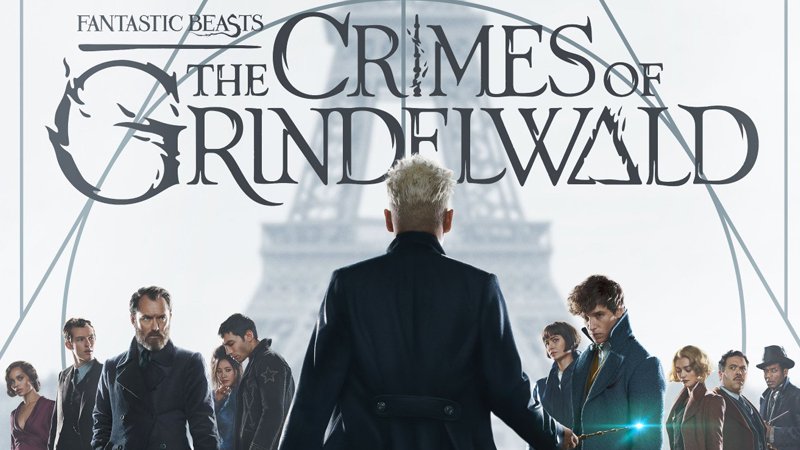
 FANTASTIC BEASTS: THE CRIMES OF GRINDELWALD
FANTASTIC BEASTS: THE CRIMES OF GRINDELWALD
Starring: Eddie Redmayne, Ezra Miller, Dan Folger, Alison Sudol, Katherine Waterston, Johnny Depp, Zoe Kravitz, Claudia Kim, Jude Law, Callum Turner
Directed by: David Yates
Written by: JK Rowling
Based upon characters created by: JK Rowling
Review by: Nick Schofield
***WARNING: MAJOR SPOILERS AHEAD***
Newt is back, baby!
The Fantastic Beasts series continues with a brand new installment: Fantastic Beasts: The Crimes of Grindelwald (FBCoG). Our plucky hero, Newt Scamander (Eddie Redmayne), finds himself thrown into a dark new adventure full of mystery, intrigue, romance(?), and lots of magic and magical beasts. Things ramp up in FBCoG–for worse and for better.
Stuck in the UK due to a travel ban, Newt is convinced by Dumbledore (Jude Law) to travel to Paris and find Credence Barebone (Ezra Miller). It is revealed that Credence–an obscurial–actually survived the incident in New York, and has begun searching for his birth mother. Between the magical ministries of the US and UK trying to eliminate Credence (along with other nefarious actors) and Grindelwald (Johnny Depp) trying to seduce the boy into joining his side, Dumbledore needs Newt to find Credence and protect him.
Newt, the ever-reluctant, non-confrontational wizard he is, struggles with the decision to go. Then, his friends Jacob Kowalski (Dan Fogler) and Queenie (Alison Sudol) arrive. Queenie–upset Jacob won’t marry her in the UK, where Wizard/Muggle marriages are legal–disappears to Paris to find her sister, Tina (Katherine Waterston). In Paris, Tina is also on the hunt to find Credence and protect him. Upon learning this, Newt and Jacob sneak out of the UK and make their way to Paris to reunite with Queenie and Tina while attempting to track down Credence. Along the way, they encounter even more fantastical creatures, powerful villains, and the insidious Grindelwald himself.
So Much is Happening, and All at Once
I liked this movie a lot, but it was a lot to handle. Lots of plotting, new characters, and plenty of retconning were stuffed into two hours. There were moments where, if you didn’t pay attention, you could miss crucial details.
Lots of New Characters
Some characters were definitely welcome additions, and others seemed a little shaky at best. Newt’s brother Theseus (Callum Turner), for example, sits right on the line. He’s definitely valuable in the sense that he provides a new window into understanding why Newt is who he is, as well as underpinning some of Newt’s convictions. However, Theseus is part of a retcon meant to bring Leta Lestrange (Zoe Kravitz) into the film and rearrange Newt’s relationship with her to pave the way for a romance with Tina. It also creates a somewhat unnecessary romantic tension.
We also get infamous franchise characters in their first on-screen (human) portrayals: Nicolas Flamel (Brontis Jodorowsky) and Nagini (Claudia Kim). It’s not really explained why Flamel is in Paris; neither is the secret network he’s part of. Perhaps this will get cleared up in the next film, but needless to say I found it him an abrupt and strange addition to FBCoG. Nagini also seems a little randomly tossed into the film, which is a shame.

Plot-on-Plot-on-Plot
FBCoG reveals a lot of new information and plot developments for the film series that get thrown at us really quick. Here’s just a quick, SPOILER-FILLED list of major facts we, as an audience, need to digest in a two-hour span:
- Newt has a brother named Theseus who’s engaged to Newt’s friend/sort-of romantic interest, Leta Lestrange
- Grindelwald, who was just trying to find a single obscurial in the last film, now wants Credence specifically because of “who he is”
- Dumbledore’s blood pact with Grindelwald (because you know, they were lovers but it’s barely addressed in the film…) means Newt must move against Grindelwald instead
- Leta caused the death of her younger brother, Corvus, when he was a baby and they were both coming to America
- Leta’s half-brother, Yusuf Kama (William Nadylam) is trying to seek revenge for the death of his and Leta’s mother by killing Credence, who he believes is Corvus
- Oh yeah, and (***MAJOR SPOILER***) Credence is actually a Dumbledore???
All of these facts and more drive the plot; missing just one can cause you to become lost. I can buy the argument that it’s plot-heavy as a way of setting up the next film in the series, but there’s ways to streamline plots so they don’t clunk around like FBCoG. There are some great payoffs toward the end of the movie, but it takes a lot of lumbering to get there.
Rowling and Women of Color
I don’t feel, given I’m a cisgendered white male, that I can adequately address this issue. I’m going to make an honest effort, however. Frankly, talking about how JK Rowling treats women of color in her narratives–both in Tweet retcons and new HP franchise works–is important.
Over the last two decades, Rowling has retroactively worked to establish the world she created as inherently diverse. This aim is not necessarily bad, but many find it misguided and dishonest. There are two sides of this that need to be addressed, too. First, that there is not a truly honest diversity/representation retconning happening; second, that retconning is meaningless when characters developed in new HP franchise installments do not reflect the ethic behind said retconning. To sum it up: if you’re gonna talk the talk, you better walk the walk.
Leta Lestrange’s Awful Arc
In FBCoG, Leta Lestrange and Nagini are prime examples of Rowling’s failure to walk the walk. Unfortunately, their story lines do not receive the just treatment they deserve. As Kadeen Griffiths wrote brilliantly in Bustle:
“…Rowling’s screenplay fails to consider that Leta is a black woman, not just a woman, and thus the troubles she faces in her arc come across as particularly problematic.”
Griffiths is dead-on, and she’s got receipts. She points to how Rowling typically uses love potions in explaining characters who succumbed to the romantic/sexual will of others. We see this again and again throughout the franchise. Yet, Leta’s father basically enslaves her mother Laurena (Isaura Barbé-Brown)–a Senegalese woman–by using the Imperius Curse. This is ridiculously cruel and tone-deaf on Rowling’s part.
Love potions don’t typically last longer than a day, which makes the difference between them and the Curse important. And at least the drinker of a love potion feels infatuation, somewhat more authentic feelings of adoration, and so on (that still doesn’t make it a good thing to do, though). Leta’s father didn’t do that. Rather, he essentially made Laurena an unwilling sex slave. She literally had no other choice but to sit there while he raped her. And then she had to give birth to Leta, which resulted in her death.
If you’re like me, you’re now squirming in your seats with how bad this whole thing sounds. Truly, it is; as Griffiths points out in her piece, this narrative perpetuates a silencing of black women’s voices against sexual assault that has deep roots in the history of slavery. As well, it turns Leta into the stereotypical “tragic mulatto” character–a trope where persons of mixed white and black heritage are portrayed as stuck between whiteness and blackness.

Nagini the Object
Much to my dismay–and I’m sure the dismay of many others–Nagini has little to no character development or story arc in FBCoG. Rowling already came under fire for retconning Nagini into an Asian woman, but I think more heat needs to be applied. In this new film, not is her story and background problematic, but she also becomes just a scene decoration in much of her time on-screen.
First of all, Nagini has one moment of action–a sort of got ya moment we’re supposed to feel happy about. She bites the ringmaster of the traveling circus in her first (and only?) on-screen transformation. After that, she’s more or less standing by as Credence searches for his birth mother. This is disappointing enough, but then think about what her future becomes. Charles Pulliam-Moore summed it up best in a Tweet back in September 2018:
“Let's retroactively turn a woman of color into a literal object owned by a white man inspired by nazis.” https://t.co/JYTQK6YFss
— Charles PM (@CharlesPulliam) September 25, 2018
By the time Nagini comes in contact with Voldemort in the HP universe timeline, she is permanently trapped in the form of a snake (due to a Maledictus curse, something I’m pretty sure is also retconned but I can’t find evidence to back my hypothesis). She essentially becomes Voldemort’s slave, evoking the submissive Asian woman stereotype; she’s also subservient to an ultra-white dude, and has to carry part of him inside her as a Horcrux. And the dude’s essentially a Nazi.
So…do you feel as gross as I do right now?
White Blindness
Look, I don’t think Rowling is a racist or a xenophobe. I think she genuinely believes what she’s doing is fair and just. I’m not going to give her brownie points for “at least making an effort,” though. But, I’d say understanding where she’s coming from is a good start in addressing the problematic aspects of her work.
Thinking back to Griffiths’ article in Bustle, I’m struck with the thought that Rowling simply tried to represent these characters as women, ignoring the fact they are women of color. There’s this tension many white writers find themselves in (myself included) around representation and developing minority characters. And, very frequently, we f*** things up trying to manage it.
Pushing off certain identities in favor of a more “universal” representation divorces that character from the political, social, and economic contexts of their time period. A character’s defining perspectives, attitudes, and personality traits vary as a result of these factors and the cultural group they belong to.
To say it in simpler terms: white creators can fall into what I call “white blindness”. Essentially, in an attempt to break a minority character from stereotypical and racist narratives, we try to treat a black woman, for example, as the universal woman. However, we have a skewed frame of view; whether consciously or subconsciously, we treat that universal woman as white. Without intending to, we blind ourselves to the contextual realities of race, gender, sexuality, economic status, etc. that inform a person’s identity.
When this blindness causes white creators to develop problematic narratives for their characters, calling them out is necessary. How to correct this issue I’m not certain of, but education and awareness can help.
A Mirror and a Warning
FBCoG is problematic, but to its credit it did some things really well. In particular, it scared me more than any film I’ve seen this year.
We know, from the start of the film (and indeed the last Fantastic Beasts movie), that Grindelwald is out to make Pureblood wizards the rulers of the world, to the detriment of Mudbloods and Muggles alike. Compared with what Voldemort espoused, this theme in the HP franchise is old hat–pretty standard by now, if you ask most people. But it’s this moment toward the end of FBCoG that completely changes everything.
Grindelwald gathers his followers in a Parisian mausoleum and gives a speech to inspire and call them to action. It’s in this dialogue where we get to see, firsthand, the insidious power of fascism.
Every beat of Grindelwald’s speech is straight from the fascist handbook. He creates scapegoats, pins the plight of wizards on them, and shifts goalposts to position Wizard governments as the bad guys. He even says he doesn’t want to eliminate Muggles; rather, they’re of a different value. Seamlessly, he makes them an “Other”.

His language use is also incredibly sinister. He co-opts love, truth, and justice to espouse his fascist beliefs, couching his evil in banality. This is so fascist it’s not even funny. And the most awful thing is that his tactics work. Queenie becomes seduced by Grindelwald’s promises and abandons Jacob, Tina, Newt, and the others.
Grindelwald’s speech was frightening to me because it felt so prescient and grounded in the real world. Many current world leaders do this–creating scapegoats, promising security through authority, etc. I suspect this was Rowling’s intent, too. She’s always spoken out about modern despots and authoritarians–particularly the current American President. Nonetheless, she created something incredibly spine-tingling, and all-too-real.
Verdict: Watch It/Wait and See
It’s tough to give it a Watch It designation now that I’ve taken some time to think FBCoG through. Initially, I loved it. But, as I’ve read more and reflected on the film, it does have some serious problems. However, these may be more an artifice of Rowling’s issues than of her Wizarding universe. It’s still a fun film, and there’s plenty about it that’s enjoyable.
If Rowling’s problematic portrayals turn you off, I’d say Wait and See. However, consider watching it–personally, I’m all for addressing problems in media head-on. As well, for creators, seeing these problems is valuable; recognizing them helps you make your work that much better.


